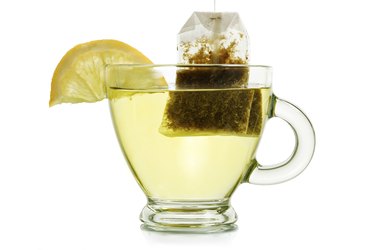
Despite the numerous health benefits arising from their high antioxidant content, teas can negatively affect your body's ability to use a variety of minerals. Chief among these is calcium, the most prevalent mineral in your body. Although some teas have a greater impact than others, all varieties of tea contain compounds that can reduce calcium levels. As a result, you should always avoid drinking tea when you take calcium supplements or eat calcium-rich foods.
Caffeine
Video of the Day
According to the Office of Dietary Supplements, caffeine affects calcium absorption in two ways. First, your body excretes greater amounts of calcium as your caffeine intake increases. Second, your body's ability to absorb calcium decreases when caffeine is present in your body. To reduce the impact of caffeine on calcium levels, you should drink tea only between meals and avoid pairing tea with a source of calcium. You can also reduce the negative impact of caffeine on calcium levels by opting for decaffeinated teas or herbal teas, most of which are naturally caffeine-free.
Video of the Day
Phytic Acid
Phytic acid is a compound in a number of whole-grain foods, vegetables and plants that reduces your body's ability to absorb minerals, including zinc, iron and calcium. According to Drs. Sareen Gropper and Jack Smith, phytic acid does so by binding with these minerals, creating compounds that your body can neither break down nor absorb. As teas are relatively high in phytic acid, you should avoid drinking tea during meals or around mealtimes.
Oxalic Acid
Another compound in teas that negatively affects calcium levels in your body is oxalic acid. Similar to phytic acid, oxalic acid binds with calcium and other minerals, effectively eliminating them from your body. Although oxalic acid has less of an impact on calcium levels than phytic acid, you should avoid consuming sources of calcium with high-oxalate teas, such as rosehip tea and black teas. Instead, you can opt for teas that are lower in oxalates, such as mate and green tea, or teas that contain no oxalates, such as oolong tea.
Boosting Calcium Absorption
Although you should generally try to avoid pairing tea with sources of calcium, Gropper and Smith suggest that you can counteract the negative effects of tea on calcium levels in a variety of ways. First, you can add more protein to your diet, as protein increases your body's ability to absorb calcium. Second, as vitamin D is essential to your body's ability to use calcium, you should always pair these nutrients. Finally, you can sweeten your tea with sugars or low-calorie sugar alcohols, such as xylitol, which also help to boost calcium absorption.